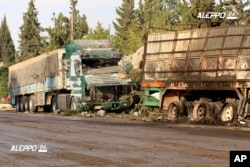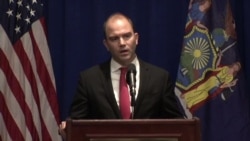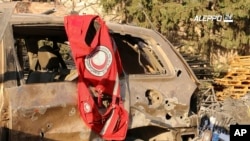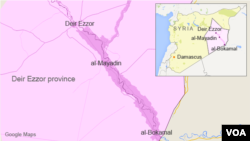The United States is holding Russia responsible for an attack on a humanitarian convoy in northern Syria that killed 20 civilians and an official of the Syrian Red Crescent society.
Ben Rhodes, a senior White House official, said all evidence shows the aid convoy was targeted by an airstrike, and since rebels in Syria have no air force, the strike could only have been conducted by Syrian government forces or their Russian allies.
The deadly airstrike west of Aleppo on Monday also destroyed 100 tons of desperately needed food and medicine.
Rhodes, President Barack Obama's deputy national security advisor, spoke to reporters Tuesday evening on the sidelines of the U.N. General Assembly meeting in New York. He noted Russia had pledged to keep its warplanes away from "places where humanitarian aid is flowing."
Moscow and Damascus deny they were involved in the attack. The Russian Defense Ministry said the wreckage -- charred remains of 18 large trucks that had been parked close together, ready to distribute supplies -- suggests that a cargo fire caused the damage and fatalities.
"We've established it was not a fire," said U.N. humanitarian spokesman Jens Laerke in Geneva.
Syria’s military also denied any of its aircraft was involved in an attack.
The convoy's “movements were only known by the militants who were in control of the area,” said Defense Ministry spokesman Igor Konashenkov in Moscow.
The attack killed 20 civilians and the head of a local Syrian Red Crescent office, the humanitarian organization said.
Obama official: US holds Russia responsible
U.N. humanitarian officials temporarily suspended all such relief efforts in Syria, while diplomats in New York tried to salvage the tattered cease-fire.
On Tuesday, the 20 member states and organizations of the International Syria Support Group (ISSG) met for about an hour in New York and decided to convene again on Friday.
“They agreed that, despite continued violence, there was still an imperative to pursue a nationwide cessation of hostilities based on the arrangement reached last week in Geneva between the United States and Russia,” said State Department spokesman John Kirby.
"The cease-fire is not dead," U.S. Secretary of State John Kerry told reporters as he emerged from the ISSG meeting.
Condemn airstrike
World leaders condemned the attack in speeches at the General Assembly.
U.N. Secretary-General Ban Ki-moon said the attack was an outrage.
Ban called the humanitarian workers' attackers cowards and said “accountability for crimes such as these is essential.”
Leaders such as French President Francois Hollande blamed Syria’s government for the cease-fire's failure.
"I say to the Syrian government's foreign backers that they must compel the regime to enforce peace," he said in his address to the world body. "Otherwise, they will bear the responsibility for the splitting up of the country and the chaos."
'Sent a very clear message'
“The Syrian government sent a very clear message by attacking the aid convoy and bombing Aleppo,” Middle East scholar Daniel Serwer from the School of Advanced International Studies at Johns Hopkins University told VOA. “The Russians don't seem able or willing to restrain [Syrian President Bashar al-]Assad. The Americans aren't willing to intervene.”
After seven days of relative calm and a resumption of critical aid, according to the terms of the cease-fire deal, the United States and Russia were to coordinate separate strikes on Islamic State and al-Qaida-affiliated rebels.
That was viewed as a remarkable diplomatic accomplishment, considering Washington and Moscow have not been allies in any hostilities since World War Two.
"Washington and Moscow have different long-term interests in Syria, support different sides of the war, and no longer trust each other based on recent breaches of the Syrian cease-fire and broader disagreements over Ukraine, the Baltic states and cyberattacks,” Seth Jones, director of the International Security and Defense Policy Center at the RAND Corporation, told VOA on Tuesday.
'Flagrant aggression'
Syrian state media quoted Assad as saying separate airstrikes by the U.S.-led coalition that hit Syrian positions near Deir Ezzor on Saturday were a "flagrant aggression" that showed support for terrorists.
The airstrikes near Deir Ezzor may have hit a battalion of Syrian prisoners, VOA learned. U.S. officials have said Syrian government prisoners may be fighting for the regime as an alternative to being jailed.
The prisoners appeared to have been providing an “extra layer of protection” outside the perimeter of the Syrian forces. A senior defense official told VOA a brigadier general would begin investigating the strike “very soon.”
The U.S. has expressed condolences for the losses suffered in the strike and is still working to determine what happened.
Carla Babb at the Pentagon, Nike Ching at the State Department and VOA's Lou Lorscheider contributed to this report.










